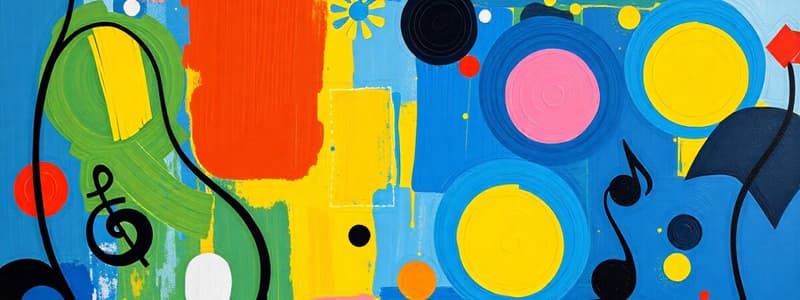Podcast
Questions and Answers
What is the main focus of the curriculum standards for Music and Arts in this lesson exemplar?
What is the main focus of the curriculum standards for Music and Arts in this lesson exemplar?
- Local concepts influenced by faiths and beliefs (correct)
- Global musical traditions and practices
- Technical skills in music production
- Historical developments in arts and music
Who is the writer of the Lesson Exemplar for Music and Arts Grade 4?
Who is the writer of the Lesson Exemplar for Music and Arts Grade 4?
- Alma Vida G. Gallardo (correct)
- Director of the Bureau of Learning Resources
- A member of the management team
- Wesly M. Tayag
What is prohibited regarding the reproduction of the material provided in this exemplar?
What is prohibited regarding the reproduction of the material provided in this exemplar?
- Using it for teaching purposes
- Sharing it with colleagues for feedback
- Unauthorized distribution and modification (correct)
- Making copies for personal study
Which institution is part of the management team for this lesson exemplar?
Which institution is part of the management team for this lesson exemplar?
What year is the implementation of the MATATAG K to 10 Curriculum focused on in the lesson exemplar?
What year is the implementation of the MATATAG K to 10 Curriculum focused on in the lesson exemplar?
What activity is suggested for activating prior knowledge on Day 1?
What activity is suggested for activating prior knowledge on Day 1?
What physical action should learners perform while singing the song?
What physical action should learners perform while singing the song?
Which of the following is NOT a suggested action during the review process?
Which of the following is NOT a suggested action during the review process?
What is the title of the song learners are encouraged to sing?
What is the title of the song learners are encouraged to sing?
What is the main purpose of the review activity in the teaching procedure?
What is the main purpose of the review activity in the teaching procedure?
Flashcards
MATATAG K to 10 Curriculum
MATATAG K to 10 Curriculum
A curriculum framework for primary and secondary education in the Philippines that emphasizes the development of knowledgeable, skilled, and values-oriented individuals.
Lesson Exemplar
Lesson Exemplar
A detailed example of a lesson plan that includes objectives, activities, and assessments, showcasing how to implement a specific lesson in the MATATAG K to 10 Curriculum.
Music and Arts
Music and Arts
One of the subjects in the MATATAG K to 10 Curriculum that focuses on developing students' understanding and appreciation of music and visual arts, including local traditions, beliefs, and practices.
Local Concepts and Practices
Local Concepts and Practices
Signup and view all the flashcards
Grade 4 Quarter 2 Lesson 1
Grade 4 Quarter 2 Lesson 1
Signup and view all the flashcards
Chua-ay
Chua-ay
Signup and view all the flashcards
Bendian Dance
Bendian Dance
Signup and view all the flashcards
Benguet
Benguet
Signup and view all the flashcards
Traditional Attire
Traditional Attire
Signup and view all the flashcards
Ibaloy
Ibaloy
Signup and view all the flashcards
Study Notes
Lesson Exemplar for Music and Arts Grade 4
- Intended for teachers implementing the MATATAG K to 10 Curriculum
- Aims to assist in delivering curriculum content, standards, and lesson competencies
- Unauthorized reproduction, distribution, modification, or utilization beyond designated scope is prohibited
- Borrowed content in the material is owned by respective copyright holders
- Publishers and development team do not claim ownership over borrowed content
Curriculum Content, Standards, and Lesson Competencies
- Content Standards: Learners demonstrate understanding of local concepts, processes, and practices of Music and Arts as influenced by the province's faiths and beliefs
- Performance Standards: Learners improvise creative works that depict the province's faiths and beliefs, using local concepts, processes, and practices in Music and Arts
- Learning Competencies and Objectives: Discuss basic concepts and principles of sound, theatre, dance, and visual elements based on the representations of local creative works
- Identify creative works in one's local area
- Recognize basic concepts and principles of sound, theatre, dance, and visual elements based on the Bendian Dance and traditional attires of Benguet
- Explain basic concepts and principles of sound, theatre, dance, and visual elements of Bendian Dance
- Content: Basic concepts and principles of sound, theatre, dance, and visual elements; faiths and beliefs in the province related to music and arts
- Integration: SGD 11 Sustainable Cities and Communities: Protect Cultural and Natural Heritage; Culture Identity; Faiths and Beliefs
Learning Resources
- Includes websites and videos related to Bendian Dance and Ibaloy culture
- Provides resources on Gong-making, traditional attire, and Benguet Festival
Teaching Procedure (Day 1)
- Review: Re-visit the song "Chua-ay" (includes singing along, stomping feet to the beat)
- Think-Pair-Share: Class to individually think, discuss with a partner, and then finally share their responses regarding the song's context and the music present
- Focus on descriptive aspects in the context of the Igorot culture
- The teacher can follow-up with questions
Teaching Procedure (Day 2)
- Watch a video of the Bendian Dance
- Learners observe and record the following during the dance: (hand positions, footwork movements, formations, pacing, instruments, traditional attire, props)
- Discuss the various instruments utilized in the Bendian dance (e.g., gongs, solibaos)
Making Generalizations
- Learner's Takeaways: Gather key takeaways from the lessons (phrases to complete: "We learned that...", "We realized that...", "We appreciated that...")
- Reflection on Learning:
- Importance of experiencing cultural events (like Bendian Dance)
- Plan to learn more about Bendian dance
- How to help preserve cultural traditions
Evaluating Learning (Formative Assessment)
- Essay/ Narratives: Learners write answers related to the discussed topics, including specific questions about Bendian Dance and the local beliefs and practices
Studying That Suits You
Use AI to generate personalized quizzes and flashcards to suit your learning preferences.




